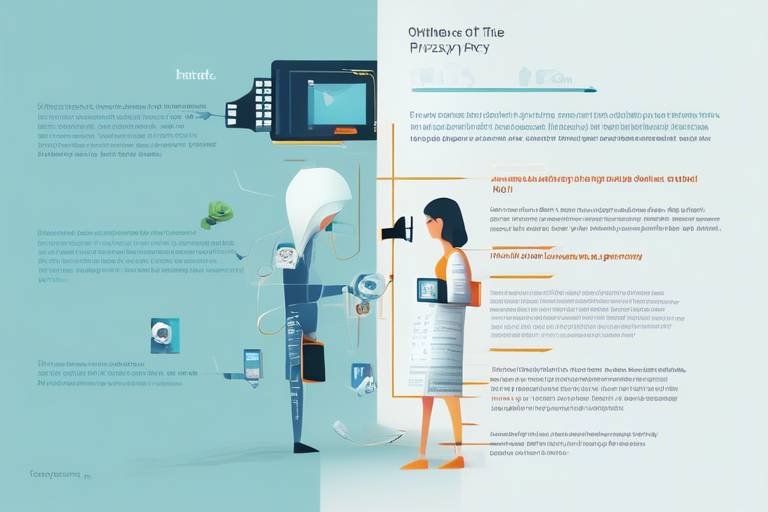Future Trends in Digital Rights and Freedoms
In today's hyper-connected world, the concept of digital rights and freedoms is evolving at an unprecedented pace. As we dive deeper into the digital age, the implications of technology on our privacy, security, and individual liberties are becoming increasingly complex. The intersection of emerging technologies like artificial intelligence (AI) and the Internet of Things (IoT) with our daily lives raises crucial questions about how we define and protect our rights in this new landscape. Are we truly in control of our digital identities, or are we merely pawns in a game dictated by corporations and governments? Understanding these dynamics is essential as we navigate through the myriad challenges that lie ahead.
The rapid advancement of technology has led to a paradigm shift in how we perceive privacy. With devices that constantly collect and analyze data, our personal information is more exposed than ever before. This reality prompts a pressing need for robust regulations that can safeguard our rights. The traditional frameworks that once governed privacy are now being challenged, necessitating a re-evaluation of how we protect individual liberties in an age where everything is interconnected. As we explore these trends, it's important to ask ourselves: what does it mean to have privacy in a world where our every move can be tracked?
Furthermore, the issue of data ownership is becoming a focal point of discussion. In a digital economy where data is often referred to as the new oil, understanding who owns this data and how it can be used is paramount. Individuals are increasingly demanding transparency and control over their personal information, leading to a shift in the balance of power between users and corporations. The evolving landscape of data rights is not just a legal issue; it's a matter of empowerment and advocacy for individuals who seek to reclaim their digital identities.
As we look towards the future, it becomes evident that legal frameworks surrounding data protection need to evolve alongside technology. Current laws, while valuable, often struggle to keep pace with rapid advancements. For instance, regulations like the General Data Protection Regulation (GDPR) in Europe have set a precedent, but compliance can be a daunting task for organizations operating globally. The complexities of adhering to varying international standards can create significant hurdles, highlighting the need for a more unified approach to data protection.
Moreover, the future of digital rights will likely see a surge in legislation aimed at reinforcing individual rights in the digital realm. As public awareness grows and advocacy groups gain momentum, we can anticipate a wave of new laws designed to enhance privacy protections and empower users. The challenge will be in balancing these rights with the need for security and innovation. After all, how can we protect our freedoms without stifling progress?
In this context, the role of social media platforms cannot be overlooked. These platforms are not just tools for communication; they are powerful instruments that shape public discourse and influence societal norms. However, the potential for censorship and the impact of content moderation practices raise significant concerns about freedom of speech. As we navigate the complexities of digital activism and advocacy, we must ask ourselves: are we fostering a space for open dialogue, or are we inadvertently silencing voices that need to be heard?
In conclusion, the future of digital rights and freedoms is a multifaceted issue that requires ongoing dialogue and engagement from all stakeholders. From individuals asserting their rights to organizations navigating compliance challenges, the road ahead is fraught with both opportunities and obstacles. As we stand on the brink of this new era, the question remains: how will we shape the future of our digital lives?
- What are digital rights? Digital rights refer to the freedoms and protections individuals have in the digital space, including privacy, data ownership, and freedom of expression.
- Why is data ownership important? Data ownership is crucial as it determines who controls personal information and how it can be used, impacting privacy and individual autonomy.
- How do social media platforms affect freedom of speech? Social media platforms can both enhance and restrict freedom of speech, depending on their content moderation policies and practices.
- What role does legislation play in protecting digital rights? Legislation establishes the legal framework for protecting digital rights, ensuring that individuals have recourse against violations and that their rights are upheld.

Emerging Technologies and Privacy
The rapid evolution of emerging technologies like artificial intelligence (AI) and the Internet of Things (IoT) is fundamentally reshaping our understanding of privacy. As these technologies become more integrated into our daily lives, they bring with them a host of challenges that existing privacy frameworks are ill-equipped to handle. Imagine your smart fridge not only keeping track of your grocery list but also collecting data about your eating habits—data that could be shared without your consent. This scenario highlights the urgent need for new regulations that prioritize individual rights in our increasingly connected world.
AI systems, for instance, are capable of processing vast amounts of personal data at lightning speed. This capability raises significant questions about how our information is used and who has access to it. As we embrace these technologies, we must also grapple with the reality that our personal data is becoming a commodity, traded and sold without our explicit permission. The challenge lies in balancing innovation with privacy—a tightrope walk that demands immediate attention from lawmakers and tech companies alike.
Furthermore, the proliferation of IoT devices means that our homes, cars, and even wearables are constantly collecting data. While this connectivity offers convenience, it also poses serious risks to our privacy. For example, consider how a smart home assistant listens to your conversations. While it may seem harmless, the potential for misuse of that data is significant. To illustrate this point, let’s take a look at some of the most pressing privacy concerns associated with emerging technologies:
| Technology | Privacy Concern |
|---|---|
| Artificial Intelligence | Data misuse and algorithmic bias |
| Internet of Things (IoT) | Constant surveillance and data collection |
| Biometric Systems | Invasive data collection and tracking |
As we navigate this new landscape, it’s crucial to advocate for robust privacy protections that are adaptable to technological advancements. This means not only crafting new regulations but also ensuring that individuals are informed about their rights. Empowering users with knowledge about how their data is collected and used can lead to a more transparent digital environment.
In conclusion, the intersection of emerging technologies and privacy is fraught with challenges that require immediate and thoughtful action. As we continue to innovate, we must also ensure that individual liberties are not sacrificed at the altar of convenience and progress. The future of our digital rights depends on our ability to adapt to these changes while safeguarding our privacy.
- What are the main privacy concerns with IoT devices? IoT devices often collect vast amounts of personal data, leading to potential misuse and unauthorized access.
- How does AI impact privacy? AI can process and analyze personal data, raising concerns about data bias and the potential for surveillance.
- What regulations are needed to protect digital privacy? New regulations should focus on data ownership, consent, and transparency in data usage.

Data Ownership and Control
The digital landscape is evolving at lightning speed, and with it comes a pressing question: who really owns our data? As we navigate this increasingly interconnected world, the concept of data ownership has transformed from a mere afterthought to a central concern for individuals and corporations alike. With the rise of the internet, social media, and IoT devices, our personal information has become a valuable asset, akin to gold in the digital age. But the real kicker is that many of us don’t even realize the extent to which our data is being collected, used, and sometimes exploited.
Imagine walking into a store, and instead of just buying a product, you’re also handing over your personal details, preferences, and habits without even knowing it. This scenario is all too common in our digital lives. Companies often collect vast amounts of data to tailor their marketing strategies, enhance user experiences, and even predict consumer behavior. However, this raises significant questions about ownership and control. Who should have the right to decide how this data is used? Should it be the corporations that collect it, or should the individuals whose data it is have a say?
As we dive deeper into the complexities of data rights, it’s essential to understand that data ownership is not just a legal issue; it’s a societal one. The implications stretch far beyond the boardrooms of tech giants. For instance, when we talk about data ownership, we must consider the following aspects:
- Informed Consent: Are users truly aware of what they’re consenting to when they click 'I Agree' on those lengthy terms and conditions?
- Data Portability: Should individuals have the right to transfer their data from one platform to another without hassle?
- Monetization of Data: Should individuals be compensated for the data they generate, or is it a fair trade-off for using free services?
Furthermore, the conversation around data ownership is becoming increasingly intertwined with issues of privacy and security. As hackers become more sophisticated, the potential for data breaches raises alarms about who is responsible for protecting personal information. Are companies doing enough to safeguard user data, or are they merely paying lip service to the idea of security? The reality is that individuals often bear the brunt of these breaches, facing the fallout of stolen identities and compromised privacy.
To navigate this complex terrain, we need robust legal frameworks that not only define data ownership but also empower individuals. Current regulations like the General Data Protection Regulation (GDPR) in Europe are steps in the right direction, granting users more control over their personal data. However, these laws are still evolving, and there’s a pressing need for global standards that address data rights comprehensively.
In conclusion, as we continue to explore the intricacies of data ownership and control, it’s clear that this is not just a technological issue; it’s a fundamental question of rights in the digital age. The landscape is shifting, and individuals must advocate for their rights to ensure that they maintain control over their data. Only then can we create a more equitable digital environment where everyone’s rights are respected and upheld.

Legal Frameworks for Data Protection
The digital age has ushered in a myriad of challenges related to privacy and data protection, prompting the need for robust legal frameworks. As we navigate through this intricate landscape, it becomes essential to grasp how existing laws function and their effectiveness in safeguarding our rights. Various jurisdictions have enacted legislation aimed at protecting personal data, yet the pace of technological advancement often outstrips these legal measures. This disconnect raises critical questions: Are current laws sufficient? Do they adapt quickly enough to address emerging threats? The answer is often a resounding no.
For instance, the General Data Protection Regulation (GDPR) in the European Union is one of the most comprehensive data protection laws globally. It grants individuals greater control over their personal data and imposes strict obligations on organizations. However, while GDPR sets a high standard, its implementation can be inconsistent across member states. Additionally, organizations outside the EU that handle data of EU citizens must comply with GDPR, leading to a complex web of compliance issues.
In contrast, the United States employs a more fragmented approach, with various sector-specific laws such as the Health Insurance Portability and Accountability Act (HIPAA) for health data and the Children's Online Privacy Protection Act (COPPA) for children's data. While these laws provide essential protections, the lack of a comprehensive federal data protection law leaves significant gaps, exposing individuals to risks. This patchwork of regulations can be confusing for both consumers and businesses, making it difficult to navigate the landscape of data rights.
Moreover, as technology continues to evolve, new challenges arise that existing laws may not adequately address. For example, the rise of artificial intelligence (AI) and machine learning introduces complexities regarding consent and data usage that current frameworks struggle to regulate. The very nature of AI, which often relies on vast datasets for training, raises questions about ownership, consent, and the ethical use of data. As we look to the future, it’s crucial for lawmakers to remain vigilant and proactive, adapting legal frameworks to keep pace with technological advancements.
To illustrate the differences in data protection laws globally, consider the following table that compares GDPR with various other frameworks:
| Framework | Region | Key Features |
|---|---|---|
| GDPR | European Union | Comprehensive data protection, right to access, right to be forgotten |
| CCPA | California, USA | Consumer rights to access and delete personal data, opt-out of sales |
| HIPAA | USA | Protection of health information, strict penalties for violations |
| PIPEDA | Canada | Consent-based data collection, right to access personal data |
As we analyze these frameworks, it’s clear that a one-size-fits-all approach does not work in the realm of data protection. Each region has unique cultural, legal, and economic factors that influence its data protection laws. Therefore, a collaborative effort among nations is essential to create a more unified and effective global standard for data protection. This could involve harmonizing regulations, sharing best practices, and establishing international agreements that prioritize individual rights while fostering innovation.
In conclusion, understanding and navigating the legal frameworks for data protection is not just a matter of compliance for businesses; it is a fundamental aspect of preserving individual freedoms in the digital age. As technology continues to evolve, so too must our laws and regulations, ensuring that they remain relevant and effective in protecting our digital rights.
- What is GDPR? GDPR stands for General Data Protection Regulation, a comprehensive law in the EU designed to protect personal data and privacy.
- Why is data protection important? Data protection is crucial for safeguarding individual privacy, preventing identity theft, and maintaining trust in digital services.
- How can individuals protect their data? Individuals can protect their data by using strong passwords, being cautious about sharing personal information, and utilizing privacy settings on social media platforms.

Global Compliance Challenges
In today's interconnected world, organizations face a myriad of when it comes to data protection and digital rights. As countries implement their own regulations, businesses must navigate a complex landscape that varies significantly from one jurisdiction to another. This is no small feat, given that what is considered acceptable in one region may be entirely illegal in another. For instance, the General Data Protection Regulation (GDPR) in the European Union sets a high standard for data privacy, while the California Consumer Privacy Act (CCPA) offers different rights and protections in the United States.
As companies expand their operations internationally, they must ensure that their data handling practices comply with these diverse regulations. The consequences of non-compliance can be severe, including hefty fines and damage to reputation. Imagine a multinational corporation facing a €20 million fine for a GDPR violation while simultaneously dealing with a class-action lawsuit in California for not adhering to CCPA standards. This is the reality many organizations face today.
Moreover, the rapid pace of technological advancement complicates compliance efforts. New technologies such as artificial intelligence (AI) and the Internet of Things (IoT) introduce additional layers of complexity. For example, how do you ensure compliance when data is being collected from smart devices that are constantly connected to the internet? The answer is not straightforward, as these devices often operate across different legal frameworks.
To illustrate the challenges organizations face, consider the following table summarizing key compliance regulations in different regions:
| Region | Key Regulation | Main Focus |
|---|---|---|
| European Union | GDPR | Data protection and privacy |
| United States | CCPA | Consumer privacy rights |
| Brazil | LGPD | General data protection |
| China | PIPL | Personal information protection |
As organizations strive to comply with these varying regulations, they often find themselves in a state of perpetual adaptation. This is where the need for a robust compliance strategy comes into play. Companies must invest in legal expertise, technology solutions, and ongoing training for employees to ensure they are aware of their obligations. Additionally, establishing a culture of compliance within the organization can significantly mitigate risks associated with non-compliance.
In conclusion, the global compliance challenges in the realm of digital rights and data protection are significant and multifaceted. Organizations must remain vigilant and proactive in their efforts to navigate this complex landscape. The stakes are high, and with the right approach, businesses can not only comply with regulations but also build trust with their customers, ultimately fostering a more secure digital environment.
- What are the main challenges of global compliance? Organizations face varying regulations, technological complexities, and the risk of severe penalties for non-compliance.
- How can companies ensure compliance? By investing in legal expertise, technology solutions, and training to build a culture of compliance.
- What is GDPR? The General Data Protection Regulation is a comprehensive data protection law in the EU that sets high standards for privacy.

Future Legislation Trends
As we look ahead, the landscape of digital rights and freedoms is poised for significant transformation. With the rapid evolution of technology, it is essential to anticipate how legislation will adapt to address emerging challenges. One of the most pressing issues is the need for comprehensive data protection laws that not only safeguard individual privacy but also promote transparency and accountability among corporations. The **General Data Protection Regulation (GDPR)** has set a precedent, but as we move forward, we can expect to see more countries adopting similar frameworks, tailored to their unique socio-political environments.
Moreover, the rise of artificial intelligence (AI) and machine learning technologies necessitates a reevaluation of existing laws. These technologies often operate in ways that can infringe on personal rights, leading to calls for regulations that specifically govern AI applications. For instance, the ethical use of AI in decision-making processes, such as hiring or law enforcement, raises serious concerns about bias and discrimination. Future legislation will likely focus on establishing clear guidelines that ensure fairness and equity in AI deployment.
Another critical trend is the push for **data ownership rights**. As individuals become increasingly aware of the value of their personal data, there is a growing demand for laws that allow users to retain control over their information. This could lead to the establishment of frameworks that enable individuals to monetize their data or at least dictate how it is used. The implications for businesses are profound, as they will need to adapt their data strategies to comply with these new regulations.
In addition to these trends, we must consider the global nature of the internet. Different countries have varying approaches to digital rights, leading to complex compliance challenges for multinational corporations. Future legislation will need to address these discrepancies, potentially through international treaties or agreements that standardize data protection practices across borders. This could foster a more cohesive approach to digital rights, ensuring that individuals are protected regardless of where they are located.
Finally, the increasing concern over cybersecurity threats will likely influence future legislation. Governments may impose stricter regulations on how organizations manage and protect sensitive data. This could include mandatory reporting of data breaches, as well as requirements for implementing robust cybersecurity measures. In this context, the balance between security and individual freedoms will be a critical focus of legislative discussions.
In summary, the future of legislation concerning digital rights and freedoms is set to be dynamic and multifaceted. As technology continues to evolve, so too must the laws that govern our digital lives. Stakeholders, including individuals, corporations, and governments, must engage in ongoing dialogue to ensure that the rights of individuals are not only recognized but actively protected in this new digital era.
- What are digital rights? Digital rights refer to the rights and freedoms that individuals have in the digital space, including privacy, data protection, and freedom of expression.
- How does legislation impact digital rights? Legislation shapes the rules and regulations that govern how personal data is collected, used, and protected, influencing the overall landscape of digital rights.
- What is the role of AI in digital rights? AI can both enhance and threaten digital rights, making it crucial for future legislation to address ethical concerns and ensure equitable use of technology.
- Why is global compliance important? As the internet transcends borders, global compliance ensures that individuals are protected under consistent standards, regardless of where they access digital services.
- What can individuals do to protect their digital rights? Individuals can advocate for their rights by staying informed, utilizing privacy tools, and supporting legislation that promotes digital freedoms.

Individual Rights in the Digital Age
In today's hyper-connected world, the concept of individual rights has taken on a new dimension. With the rapid advancement of technology, especially the internet, our rights are both empowered and challenged like never before. The digital age has transformed how we communicate, share, and consume information, but it has also introduced a myriad of complexities regarding privacy, consent, and autonomy. Have you ever thought about how much of your personal information is floating around in cyberspace? It’s a bit like leaving your front door wide open while you’re out for the day—inviting, yet risky.
One of the most pressing issues is the right to privacy. In the digital context, privacy isn't just about keeping secrets; it's about maintaining control over your personal information. With the rise of data collection practices by corporations and governments, individuals often find themselves at the mercy of entities that can exploit their data. Imagine a world where every click you make is tracked, analyzed, and sold. It sounds dystopian, doesn't it? Yet, this is the reality for many in the digital landscape.
Moreover, the right to access information is another critical aspect of individual rights in the digital age. The internet has democratized knowledge, but it has also birthed a new form of gatekeeping. Social media algorithms can dictate what information you see, often prioritizing sensational content over factual reporting. This raises an important question: if our access to information is controlled, can we truly say we are free? The answer is complex, and it leads us to the importance of advocacy and empowerment in asserting our rights.
Advocacy plays a crucial role in this digital era. Organizations and individuals alike are stepping up to fight for digital rights, pushing back against surveillance practices and advocating for stronger protections. Empowerment is key; individuals must be educated about their rights and the tools available to them. For example, using privacy-focused tools and services can help reclaim some of that lost autonomy. Here are a few actions individuals can take to assert their rights:
- Utilize strong passwords and two-factor authentication to enhance account security.
- Be mindful of the permissions granted to apps and services; only share what is necessary.
- Educate yourself about your digital footprint and how to manage it effectively.
- Engage in discussions about digital rights and support organizations that advocate for these issues.
As we navigate this digital landscape, it's essential to remember that our rights don't disappear in cyberspace. They evolve. The challenge lies in ensuring that these rights are respected and upheld, despite the rapid pace of technological change. In a world where surveillance is pervasive and data is currency, the fight for individual rights is more critical than ever. So, are you ready to stand up for your digital rights? The journey may be complex, but the outcome is worth the effort.
Q: What are my rights regarding my personal data?
A: You have the right to know what data is collected, how it's used, and to request its deletion under various data protection laws like GDPR.
Q: How can I protect my privacy online?
A: Use strong passwords, enable two-factor authentication, and be cautious about the information you share on social media.
Q: What should I do if I feel my rights are being violated online?
A: Document the violation and report it to relevant authorities or advocacy groups that specialize in digital rights.

Impact of Social Media on Freedoms
In today's digital landscape, social media platforms have become the beating heart of public discourse. They are not just places to share cat videos or vacation photos; they are arenas where ideas clash, movements are born, and voices, once silenced, can be amplified. However, with great power comes great responsibility—or, in some cases, great peril. The influence of social media on freedom of speech is profound, yet it raises critical questions about censorship and the role of these platforms in moderating content. Are they champions of free expression or gatekeepers of information?
One of the most significant impacts of social media on freedoms is the democratization of voice. Anyone with an internet connection can share their thoughts, rally support for causes, and challenge the status quo. This was evident during movements like the Arab Spring, where social media played a pivotal role in organizing protests and spreading awareness. Yet, the same platforms that empower users can also stifle them through algorithmic suppression and targeted censorship. Imagine shouting into a crowded room only to have the crowd quiet down and ignore you—this is what many users experience when their posts are buried or flagged.
Moreover, the balance between safety and freedom is a tightrope walk that social media companies must navigate. On one hand, they need to protect users from hate speech, misinformation, and harmful content. On the other hand, they risk infringing on individual rights by over-censoring or applying biased moderation practices. For instance, a post that critiques a political figure could be flagged as "hate speech," while similar posts from other users might slip through the cracks. This inconsistency raises questions about who decides what is acceptable and what isn't, leading to accusations of bias and unfair treatment.
As we dive deeper into the implications of social media on freedoms, it's crucial to understand the role of content moderation practices. These practices are often shrouded in mystery, with algorithms and human moderators working behind the scenes to filter content. However, the lack of transparency can lead to mistrust among users. Are these platforms truly committed to fostering a safe environment, or are they more focused on their bottom line? The reality is that many users feel like they are at the mercy of opaque rules and guidelines that can change without notice.
Despite these challenges, social media has also become a powerful tool for digital activism and advocacy. Movements like #MeToo and Black Lives Matter have leveraged social media to raise awareness, mobilize support, and drive change. These platforms have allowed activists to connect with like-minded individuals, share resources, and amplify their messages on a global scale. In this sense, social media serves as a double-edged sword: it can both empower and endanger freedoms, depending on how it is used and regulated.
In conclusion, the impact of social media on freedoms is multifaceted and complex. While it offers unprecedented opportunities for expression and advocacy, it also presents significant challenges related to censorship, bias, and the balance between safety and freedom. As users, we must remain vigilant and advocate for our rights in this ever-evolving digital landscape. The conversation about social media's role in our lives is just beginning, and it’s one that we must all engage in to ensure that our freedoms are preserved and protected.
- How does social media affect freedom of speech?
Social media can amplify voices and promote free speech, but it can also lead to censorship and suppression of certain viewpoints. - What are content moderation practices?
Content moderation practices involve filtering and managing user-generated content to maintain community standards and ensure user safety. - Can social media be a tool for activism?
Yes, social media has been instrumental in organizing movements and raising awareness for various causes around the world. - What are the risks associated with social media use?
Risks include exposure to misinformation, potential censorship, and the impact of biased moderation practices on user rights.

Content Moderation Practices
In the digital age, content moderation has become a crucial aspect of maintaining a healthy online environment. With millions of posts, tweets, and videos shared every minute, platforms face the daunting task of filtering out harmful content while ensuring freedom of expression. But how do these moderation practices really work, and what implications do they have for user rights?
At its core, content moderation involves the review and management of user-generated content to ensure it adheres to community guidelines and legal standards. This can include anything from removing hate speech and misinformation to addressing issues of harassment and bullying. However, the methods employed for moderation can significantly impact users’ rights and the overall discourse on these platforms.
Many platforms utilize a combination of automated systems and human moderators to manage content. Automated systems, powered by artificial intelligence, can quickly flag potentially harmful content based on keywords or patterns. While this approach is efficient, it often lacks the nuance required to understand context. For instance, an AI might mistakenly flag a political satire post as hate speech, thereby stifling legitimate expression.
On the other hand, human moderators bring a level of understanding that machines currently cannot replicate. However, this raises questions about bias and transparency. How do we know that a moderator's personal beliefs or biases don’t influence their decisions? This concern is amplified when we consider the lack of clear guidelines that many platforms provide. Users often find themselves in the dark about why their content was removed or accounts suspended, leading to frustration and a sense of injustice.
Moreover, the lack of transparency can create a chilling effect, where users self-censor out of fear that their content might be misinterpreted or unfairly moderated. This phenomenon raises significant concerns about freedom of speech in digital spaces. As users navigate these platforms, they may feel pressured to conform to a narrow set of acceptable views, stifling diverse opinions and discussions.
In light of these challenges, several organizations and advocacy groups are pushing for more robust content moderation policies that prioritize transparency and fairness. For instance, some propose the establishment of independent oversight boards that can review moderation decisions and provide recourse for users who feel wronged. This could help ensure that moderation practices are not only effective but also equitable.
As we move forward, it’s essential for platforms to strike a balance between maintaining a safe online environment and protecting individual rights. The conversation around content moderation is ongoing, and as users, we must remain vigilant and advocate for practices that uphold our freedoms while fostering respectful discourse.
- What is content moderation? Content moderation refers to the processes used by online platforms to manage user-generated content, ensuring it complies with community guidelines and legal standards.
- Why is content moderation important? It helps create a safe online environment by removing harmful content, but it also raises concerns about censorship and freedom of speech.
- How do platforms moderate content? Platforms typically use a combination of automated systems and human moderators to review and manage content.
- What are the challenges of content moderation? Challenges include bias, lack of transparency, and the potential for unfair censorship of legitimate content.
- What can users do if they feel their content was unfairly moderated? Users can often appeal moderation decisions through the platform's established processes, and advocacy groups are working towards more transparent practices.

Digital Activism and Advocacy
In today's hyper-connected world, the landscape of activism has undergone a seismic shift. Digital activism is not just a trend; it's a powerful movement that empowers individuals and groups to advocate for change from the comfort of their own homes. Imagine being able to rally millions of supporters with just a few clicks. This is the magic of digital platforms! With social media, blogs, and online petitions, activists can amplify their voices like never before. But what does this mean for the future of advocacy?
Digital activism has transformed the way we engage with social issues. It allows for rapid dissemination of information, enabling movements to gain traction almost overnight. For instance, the #MeToo movement spread globally in a matter of days, highlighting the power of social media in raising awareness about sexual harassment and assault. Activists can share personal stories, organize protests, and even influence policy changes, all through the digital realm. This shift is akin to the printing press revolutionizing the spread of information centuries ago—it's a game changer!
However, with great power comes great responsibility. While digital activism has its perks, it also faces numerous challenges. One of the most pressing issues is the potential for misinformation. In a world where anyone can publish content, distinguishing fact from fiction becomes increasingly difficult. Activists must navigate this murky water carefully, ensuring that their messages are not only impactful but also accurate. The fight for truth in the digital age is as crucial as the fight for justice.
Moreover, the very platforms that empower activists can also stifle their voices. Content moderation practices on social media can lead to censorship, where posts are removed or accounts are suspended for violating vague community guidelines. This raises questions about bias and transparency. Are these platforms truly neutral, or do they have agendas that affect which voices get heard? The balance between ensuring safety and protecting freedom of expression is a tightrope walk that many activists find themselves on.
To navigate these challenges, digital activists are increasingly turning to innovative strategies. They are harnessing the power of data analytics to understand their audiences better and tailor their messages accordingly. By analyzing engagement metrics and feedback, activists can refine their approaches to reach broader audiences. Additionally, collaborations between grassroots organizations and tech companies are becoming more common, creating tools that help activists amplify their messages while safeguarding their digital rights.
As we look to the future, the role of digital activism will only continue to grow. With the rise of virtual reality and augmented reality, the potential for immersive storytelling in advocacy is on the horizon. Imagine experiencing the struggles of marginalized communities through a VR headset—it's a profound way to foster empathy and drive change. Digital activism is evolving, and those who adapt will be the ones who lead the charge for a more equitable world.
In conclusion, digital activism and advocacy are reshaping our society in significant ways. While there are challenges to overcome, the opportunities for impact are immense. As individuals, we have the power to engage, advocate, and fight for our rights and the rights of others in this digital age. So, the next time you see a cause that resonates with you online, remember: your voice matters, and you have the tools to make a difference!
- What is digital activism? Digital activism refers to the use of digital tools and platforms to advocate for social, political, or environmental change.
- How can I get involved in digital activism? You can start by following causes you care about on social media, signing online petitions, and sharing information to raise awareness.
- What are some challenges faced by digital activists? Challenges include misinformation, censorship, and the risk of burnout due to the fast-paced nature of digital advocacy.
- How do social media platforms impact advocacy? Social media platforms can amplify voices and spread awareness but can also lead to censorship and biased content moderation.

Future of Cybersecurity and Rights
The digital landscape is evolving at an unprecedented pace, and with it, the future of cybersecurity is becoming a pressing concern for individuals and organizations alike. As we navigate through this interconnected world, the implications for our digital rights are profound. Cyber threats are no longer just technical challenges; they have become a complex web that intertwines with our personal freedoms, privacy, and the very fabric of our society. The question arises: how do we balance the need for security with the preservation of our rights?
With the rise of sophisticated cyber threats, such as ransomware attacks and data breaches, the stakes have never been higher. Organizations are compelled to implement robust cybersecurity measures to protect sensitive data. However, in doing so, they often collect vast amounts of personal information, raising concerns about surveillance and the potential misuse of data. This creates a paradox where enhanced security measures may infringe on individual freedoms, leading to a growing tension between security and privacy.
Moreover, the advent of technologies like Artificial Intelligence and machine learning in cybersecurity brings both opportunities and challenges. On one hand, AI can significantly improve threat detection and response times; on the other hand, it can also be used to create more sophisticated attacks. This duality forces us to reconsider our approach to digital rights. Are we prepared to accept a future where our rights are compromised in the name of security?
As we look ahead, it's essential to foster a dialogue about the rights of individuals in the digital realm. This includes advocating for transparency in how organizations handle personal data and ensuring that cybersecurity measures do not overreach. The implementation of privacy-by-design principles in cybersecurity strategies can help mitigate risks while respecting individual rights. For instance, companies can adopt practices that prioritize user consent and data minimization, thus ensuring that personal information is only collected when absolutely necessary.
Furthermore, legislative frameworks must evolve to keep pace with technological advancements. New laws should not only focus on enhancing security but also on protecting individual freedoms. This includes establishing clear guidelines on data collection, storage, and sharing practices. As we push for these changes, it is crucial to engage in discussions with policymakers, tech companies, and civil society to create a comprehensive framework that safeguards our rights in the digital age.
In this context, organizations must also invest in cybersecurity education for their employees and users. By fostering a culture of awareness, individuals can better understand their rights and the implications of their digital actions. This empowerment is vital in a world where knowledge is power, enabling individuals to advocate for their rights and hold organizations accountable for their practices.
In summary, the future of cybersecurity and rights is a complex interplay of technology, policy, and individual agency. As we forge ahead into this digital frontier, it is imperative to strike a balance between security and the preservation of our freedoms. By addressing these challenges head-on, we can work towards a future where cybersecurity enhances, rather than undermines, our digital rights.
- What are digital rights? Digital rights refer to the rights of individuals to access, use, create, and publish digital media or data without interference or censorship.
- How do cybersecurity measures affect individual rights? While cybersecurity measures are essential for protecting data, they can sometimes lead to increased surveillance and potential violations of privacy.
- What can individuals do to protect their digital rights? Individuals can stay informed about their rights, use privacy-focused tools, and advocate for stronger data protection laws.
- Why is transparency important in cybersecurity? Transparency ensures that organizations are held accountable for their data practices, fostering trust and protecting individual rights.
Frequently Asked Questions
- What are digital rights?
Digital rights refer to the rights and freedoms that individuals have in the digital environment. This includes the right to privacy, freedom of expression, and access to information online. As technology evolves, these rights are increasingly important to protect against misuse and violations.
- How do emerging technologies impact privacy?
Emerging technologies like AI and IoT devices pose significant challenges to existing privacy norms. They collect vast amounts of data, often without explicit consent, leading to a need for updated regulations that prioritize individual privacy and data protection.
- Who owns the data I generate online?
The question of data ownership is complex. Generally, individuals have rights over their personal data, but companies often claim ownership of the data generated through their services. This evolving landscape raises important questions about how data rights are defined and enforced.
- What legal frameworks exist to protect digital rights?
Various legal frameworks govern data protection, including the General Data Protection Regulation (GDPR) in Europe and the California Consumer Privacy Act (CCPA) in the United States. These laws aim to safeguard individuals' digital rights, though their effectiveness can vary based on enforcement and compliance.
- What challenges do organizations face with global compliance?
Navigating compliance with different global data protection regulations can be a daunting task for organizations. Each region may have unique requirements, leading to complexities in maintaining compliance while ensuring the protection of user data.
- How can individuals assert their rights in the digital age?
Individuals can assert their digital rights by being informed about their rights, advocating for transparency, and utilizing tools that enhance privacy and security. Engaging in digital activism and supporting policies that protect digital freedoms are also effective ways to empower oneself.
- What role does social media play in freedom of speech?
Social media platforms are crucial for facilitating freedom of speech, allowing individuals to express their opinions and share information. However, they also face challenges related to censorship and content moderation, which can impact users' rights to free expression.
- How does content moderation affect user rights?
Content moderation practices can raise concerns about bias and transparency, potentially infringing on user rights. Striking a balance between maintaining safety and ensuring freedom of expression is a significant challenge for social media platforms.
- What is digital activism?
Digital activism refers to the use of online platforms and tools to promote social and political causes. It has transformed how movements operate, enabling broader participation and advocacy for digital rights and freedoms.
- How do cybersecurity threats impact digital rights?
As cyber threats become more sophisticated, they pose significant risks to digital rights. Effective cybersecurity measures are essential to protect individual freedoms, but they also raise questions about surveillance and the potential infringement of privacy rights.



















